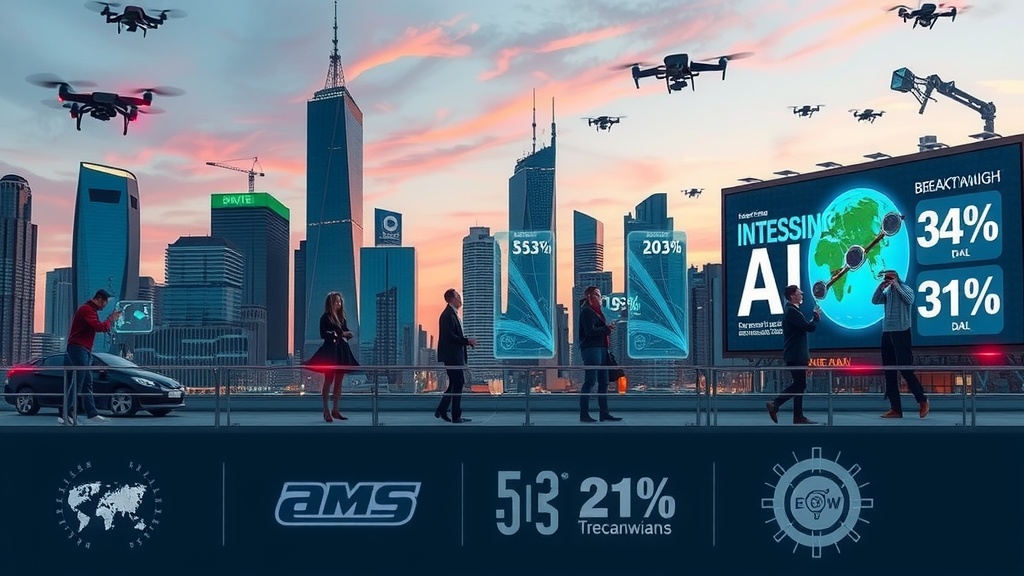AI Revolution Continues: Key Breakthroughs and Trends Shaping 2025
AI Revolution Continues: Key Breakthroughs and Trends Shaping 2025
Lead Paragraph
The year 2025 is witnessing rapid advancements in Artificial Intelligence (AI), with breakthroughs ranging from open-source initiatives like Baidu's Ernie to the rise of multi-modal Large Language Models (LLMs) capable of processing diverse media. These developments are poised to transform industries and daily life.
Main Body
Open-Source Initiatives and Collaboration
Baidu, the Chinese tech giant, is set to open-source its next-generation AI model, Ernie, by June 30, 2025. This strategic move aims to encourage broader collaboration and accelerate innovation within the AI community globally. According to Crescendo.ai, this initiative could democratize AI development, allowing more researchers and developers to access and improve upon cutting-edge technology.
"Open-sourcing Ernie will allow for greater collaboration and innovation in the AI space," stated a Baidu spokesperson.
The Rise of LLMs 3.0
Large Language Models 3.0 (LLMs 3.0) are revolutionizing AI capabilities. Unlike their predecessors, these models exhibit multi-modal mastery, seamlessly processing and generating content across text, images, videos, and audio. ITS Dart reports that this ability enables richer, more natural interactions and opens up new possibilities for AI applications.
This advancement allows AI to create cohesive and contextually aware outputs that are increasingly rivaling human creativity, leading to breakthroughs in automated content creation and more intuitive user interfaces.
Deep Learning Advancements
Deep learning architectures, such as Convolutional Neural Networks (CNNs) and Recurrent Neural Networks (RNNs), are achieving human-level accuracy in image and speech recognition. Ironhack notes that these improvements are transforming sectors like media, security, and accessibility, enhancing efficiency and accuracy in various tasks.
For instance, AI-powered surveillance systems can now identify potential threats with unprecedented precision, while AI-driven accessibility tools are providing more inclusive experiences for individuals with disabilities.
Next-Generation Natural Language Processing (NLP)
Transformer-based models, exemplified by OpenAI’s GPT-4, continue to push the boundaries of human-like text generation. Ironhack highlights that this innovation is driving advancements in customer service, search engine optimization, and automated content creation. Businesses are leveraging these capabilities to provide more personalized and efficient customer experiences.
These models are also being utilized to generate high-quality content for marketing, education, and entertainment purposes, reducing the need for human writers in certain cases.
AI Transformation in Healthcare
AI is playing a crucial role in healthcare, significantly improving the early detection of diseases like cancer and diabetes. Ironhack reports that AI algorithms can analyze medical images and patient data with greater accuracy, leading to earlier diagnoses and improved treatment outcomes. Furthermore, AI is accelerating drug discovery and personalizing patient care, enhancing the overall effectiveness of medical interventions.
"AI's ability to analyze complex medical datasets is revolutionizing how we diagnose and treat diseases," commented a leading healthcare researcher.
Enhanced AI Autonomy and Integration
AI-powered agents are becoming more autonomous, seamlessly integrating into both work and home environments. Microsoft reports that this trend promises to simplify daily tasks and improve efficiency through intelligent assistance. From smart home management to automated workflow processes in businesses, AI is enhancing productivity and convenience.
These agents can learn user preferences and adapt to changing needs, providing personalized assistance and automating routine tasks.
Groundbreaking Capabilities of Modern AI Systems
Multi-Modal Communication and Content Creation
LLMs 3.0 demonstrate the capacity to simultaneously understand and generate content across multiple media types, including text, images, video, and audio. According to ITS Dart, this enables cohesive and contextually aware outputs that rival human creativity. This capability is transforming industries like marketing, entertainment, and education, empowering creators to produce more engaging and immersive experiences.
Advanced Cognitive and Reasoning Skills
Modern AI exhibits complex logical reasoning akin to human experts, sophisticated pattern recognition, and advanced problem-solving in mathematical and scientific domains. ITS Dart explains that this level of cognitive capability is enabling AI to tackle complex challenges in various fields, from financial modeling to scientific research.
Domain-Specific Expertise
AI models are increasingly integrated with specialized knowledge bases, enabling them to function as powerful tools in distinct industries. ITS Dart highlights that this integration is particularly impactful in sectors like healthcare (medical databases), finance (economic modeling), scientific research, and legal analysis. AI is becoming an indispensable tool for professionals in these fields, enhancing their ability to analyze data, make informed decisions, and solve complex problems.
Improved Reliability and Accuracy
Significant progress has been made in reducing AI hallucinations through real-time fact-checking, confidence scoring, and verification against trusted sources. ITS Dart notes that this is increasing the trustworthiness and factual accuracy of AI-generated content. These advancements are crucial for building user trust in AI systems and ensuring that AI-driven decisions are based on reliable information.
Recognition and Awards in AI Innovation
The year 2025 also celebrates the visionaries and innovators advancing AI in areas such as predictive analytics, generative AI, and explainable AI. These leaders are being recognized for pushing the frontiers of AI excellence across multiple domains. Bintelligence reports that these awards highlight the significant contributions of individuals and organizations in shaping the future of AI.
Conclusion
The advancements in AI during 2025 represent a significant step towards more intelligent, versatile, and reliable AI systems. The open-source initiatives, the rise of multi-modal LLMs, and the integration of AI into various industries are paving the way for a future where AI plays an increasingly integral role in our lives. The continued focus on improving accuracy and reliability will be crucial for building trust and ensuring that AI benefits society as a whole.
The implications of these developments are far-reaching, with the potential to transform industries, improve healthcare, and enhance daily life. As AI continues to evolve, it will be essential to address ethical considerations and ensure that AI is developed and used responsibly.
Key Takeaways
- Baidu's Ernie Open-Source: Baidu plans to open-source its next-generation AI model Ernie by June 30, 2025, fostering global collaboration.
- LLMs 3.0 Multi-Modal Mastery: Advanced Large Language Models are capable of processing and generating content across text, images, video, and audio.
- Healthcare AI Transformation: AI is improving early disease detection, accelerating drug discovery, and personalizing patient care in healthcare.
- Enhanced AI Autonomy: AI-powered agents are becoming more autonomous, integrating into work and home environments to simplify tasks.
- Improved AI Reliability: Progress in real-time fact-checking and confidence scoring is enhancing the trustworthiness and accuracy of AI-generated content.







